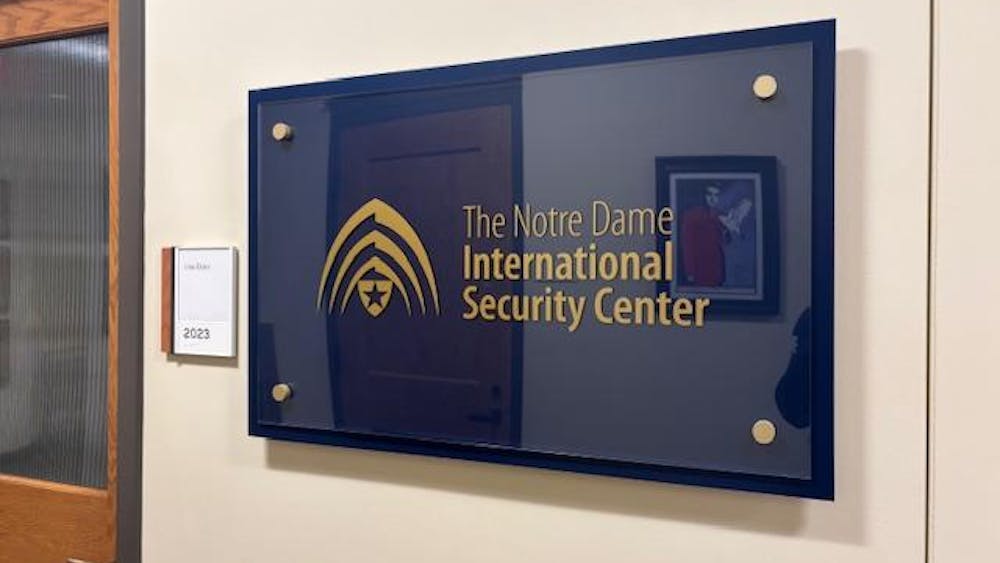Local law enforcement responded to questions about the new dorm swipe access policy, emergency blue lights on campus, discrimination at Notre Dame and other student safety concerns during a panel hosted by student government and the Notre Dame Police Department (NDPD) in the LaFortune Ballroom on Wednesday night.
Panelists included NDPD captain Rob Martinez, NDPD major George Heeter, NDPD deputy chief Steve Smith and major Steve Noonan of the St. Joseph County Police Department. Attendees were invited to submit questions through the app, Poll Everywhere, or ask them publicly using a microphone.

Multiple questions centered around whether NDPD has considered increasing the number of blue light phone systems, which are mainly located on the perimeter of Notre Dame’s campus. There are about 65 blue light emergency stations on campus currently, Martinez said. Smith said there has been discussion about increasing the number of blue lights, but currently, they are not used very frequently.
“I think folks know where they are, and they know they can utilize them anytime they want, but to be quite honest, very few calls … are actually coming through those devices,” Smith said. “So if there is a need to increase [blue light emergency stations], we would certainly do that, but again we don’t get a lot of information or a lot of requests for service through those.”
Several attendees also raised questions about safety following the implementation of the new dorm swipe access policy, which restricts students’ swipe access to their own dorms. Questions raised were concerns about people allowing strangers into their dorms, and attendees asked if there were any policies in the works to address this issue.
Smith said he doesn’t know of any pending policies yet that are to be implemented in the dorms soon.
“The one thing I would suggest is make sure you never leave a door propped open,” Smith said. “That’s been an issue in the past. … We encourage you not to do that, because it invites folks to come on in anytime they want. So to the extent that you can, I would ask that you monitor who comes in and not necessarily just let anybody in.”
In response, one attendee submitted a question, raising concerns that women in particular might not feel comfortable turning away men who come to their dorms. The question asked if “full-time clerks” could be implemented in dorms to monitor who enters and exits.
“That would be a great solution,” Smith said. “However, I think trying to staff an entrance like that is challenging.”
Smith said NDPD has also considered installing cameras at the entrances of dorms to keep track of who comes into the dorm.
“It’s early on in those discussions, but that is something that could help mitigate some of that,” he said. “And I understand it’s challenging. So what I would recommend, again, is getting to know your officers in the building. If there’s certain times of day that this is becoming an issue, let your officers know. Make them aware of that, and we can set extra patrols during that time.”
In response, a student asked why the dorm swipe access policy was implemented, and suggested tracking students’ entrance to dorms with ID cards would be easier than other proposed safety solutions.
“I think the University would have a perfect solution to address that issue, but it is very challenging to utilize a card so that every single person has to go through and that access is recorded, so we have documentation of that,” Smith said. “Again, that comes down to a University decision.”
Martin added that the policy mirrored what other schools have enacted.
“There was some benchmarking done on the process,” he said. “They’ve also been following some other universities that have actually implemented this policy.
One question asked about how NDPD would response to racist slurs and threats to students of color on campus, especially in light of threats to minority students at Syracuse. NDPD is also investigating reports of “biased slurs” directed toward students Friday and Saturday that sparked a protest against hate speech.
“Obviously, that’s something we want folks to report to us,” Smith said. “If you see behavior like that, or you learn of behavior like that, we want to know about it right away.”
In response to a question about discrimination against LGBTQ students, law enforcement also encouraged students to report incidents to the police.
Smith also discussed options for students who report sexual assault to law enforcement.
“You have the option of saying ‘I want Notre Dame Police Department and the investigative team in Notre Dame Police Department to investigate that,’” he said. “Or, in St. Joseph County, we also have a Special Victims Unit … and as a student, you have the option of opting for them to investigate that crime as well.”
When asked about safety in South Bend, Noonan recommended traveling in groups and being aware of one’s location. He also explained the situations that generally give rise to violence in South Bend.
“Generally that violence is directed for a variety of reasons,” he said. “Sometimes it’s gang activity, sometimes a social media post can trigger violence. … The best thing for students is to stay in a group [and] always know where you’re going.”
Heeter offered similar advice.
“Know your surroundings, [there’s] strength in numbers, so always be with a group of other individuals,” he said.









